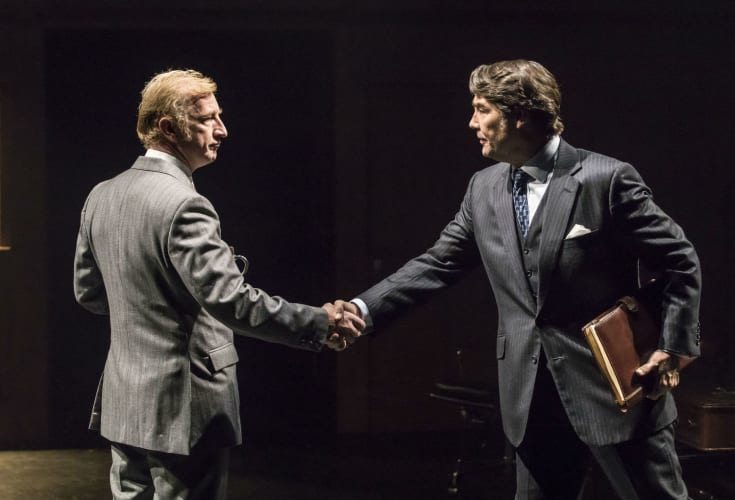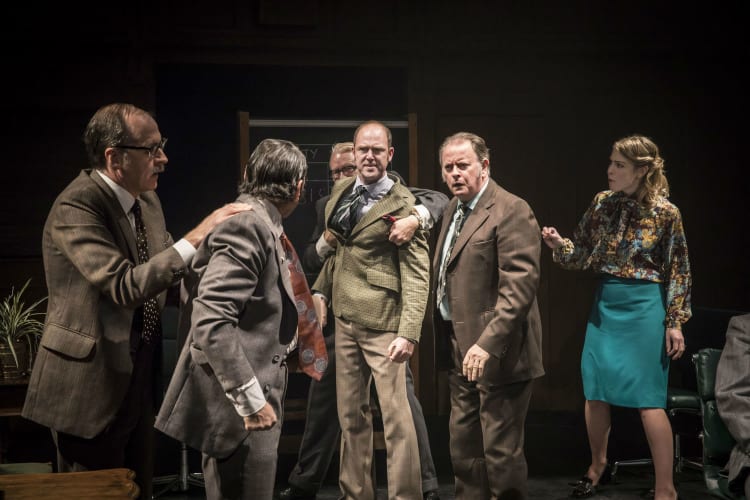James Graham has taken the subject of Parliament between the years of 1974 and 1979 and given us an account of how it was “because” he says “the truth of what happened at that time is just so incredible”.
The major figures of the period (Harold Wilson, Jim Callaghan, Ted Heath, Margaret Thatcher) are kept off-stage and the play, dramatised but almost all true, concentrates on the battle between the whips of both parties and the lengths to which they will go to make sure their side wins.
In 1974, Labour is in power with Harold Wilson at the head, but with such a small majority that every vote counts and, with the future of the country hanging in the balance, the whips bring in any member eligible to vote, from their hospital bed if necessary or even flown in by helicopter if distance demands it.
The action mostly takes place in the Labour and Conservative whips’ offices, each cleverly achieved by judicious lighting, and the differences between the two camps are emphasised. Chief Whip in the Labour camp is Bob Mellish (Phil Daniels) representing the working class and giving full and raucous voice to his opinions. Malcolm Sinclair as Humphrey Atkins on the Conservative side is mild-mannered, dignified and smugly upper class, but nothing is quite so black and white.
Stefan Rhodri as Labour’s Walter Harrison shows he has a conscience and a heart, while Conservative’s Jack Weatherill (Nathaniel Parker) is oilily sure of himself yet nobly prepared to sacrifice himself and his career for the same cause. Junior whip Ann Taylor (Lauren O’Neil) has no such qualms. She is sympathetic to a woman trying to breastfeed her baby but, when a vote is at stake, ready to bring in a dying man to make up the numbers “Well he will die happy”.
The House of Commons has been cleverly recreated in the Minerva with panelled walls, the familiar green benches and the Speaker’s Chair at the end, which can conveniently slide out of sight as a Members' Bar takes precedence. Presiding over the scene is The Great Westminster Clock which really did break down in 1976, probably in despair at the shenanigans it saw below.
It is this year that The House is voting on Labour’s plans for nationalisation of aircraft and shipbuilding and a Labour MP breaks his “pairing”agreement with a Tory counterpart, the one vote lead causing “all hell to break loose” when the cheating is discovered. Punches are thrown, chaos reigns and amid all the brawling Michael Heseltine grabs the Mace and whirls it madly around before rushing offstage. At this point I had no idea what was going on, but it was very exciting.
Performances are superb, Jeremy Herrin’s direction is tightly controlled, but I have to admit that, not being overly familiar with the political situation at that time, I found it often difficult to know what was going on. I could, though, still empathise with the characters and the situations and the play is funny (especially if you can make the connection), pathetic, crazy and tragic in turn. Others in the audience found it hilarious.
A lot of it makes one despair of party politics but, as Jack Weatherill says, “the system is archaic, old-fashioned, bollocks—but it works”.


